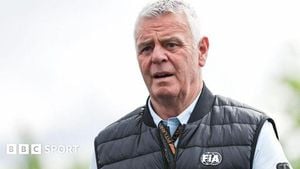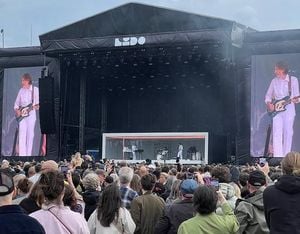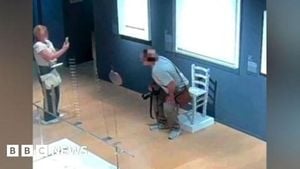On June 14, 2025, downtown Seoul became a vibrant and contested stage as the 26th annual Seoul Queer Parade unfolded alongside a series of other significant rallies, drawing tens of thousands of participants and sparking heightened activity across the city.
From 11 a.m. until 7 p.m., the Seoul Queer Culture Festival, organized by the Seoul Queer Culture Festival Organizing Committee, took place along Namdaemun-ro and Ujeongguk-ro in Jung-gu. The event, a hallmark celebration of sexual minorities, attracted an estimated 30,000 participants, all eager to express pride and visibility in a society where LGBTQ+ communities continue to seek recognition and rights.
Despite a scorching summer day with temperatures soaring above 30 degrees Celsius, the festival buzzed with energy. Attendees adorned themselves with rainbow scarves and sported rainbow-colored tattoo stickers on their faces and arms, proudly displaying the emblematic colors of the LGBTQ+ community. Among the crowd was Mr. Yoo Mo, 30, who crafted a special rainbow-colored cotton candy bouquet, explaining, "Usually, people wave flags a lot, but this time I wanted to send something special." His creative gesture encapsulated the festival's spirit of unique celebration and solidarity.
Not all attendees identified as sexual minorities; some came in support and curiosity. Mr. Lim Mo, 34, who has attended the festival for three years as a show of solidarity rather than personal identity, remarked, "There are many fun events and lots to learn at the booths. I participate as if studying different cultures." Such perspectives highlight the festival's role as both a cultural and educational experience, broadening understanding beyond the immediate community.
The festival featured over 70 booths, representing a diverse array of participants. LGBTQ+ organizations, embassies from countries including the United Kingdom, France, and Canada, and university LGBTQ+ clubs from institutions such as Hanyang University, Yonsei University, and Kyung Hee University were all present. Gwinny (a pseudonym), 25, head of Aqua, Kyung Hee University's LGBTQ+ club, explained their motivation: "We attend every year to let people know that LGBTQ+ individuals 'are here.' We seldom get opportunities to show our true colors, but today, we can make our existence known." This sentiment underscored the parade's importance as a rare public platform for visibility and affirmation.
Civil society organizations also joined the festivities, including the Korean Federation of Trade Unions (KCTU), the Korean Federation of Press Workers Unions, Lawyers for a Democratic Society (Minbyun), the Korean Peasant League (Jeonnong), and the Korean Women Peasant Association (Jeonyeonnong). Their presence signaled a broader coalition of support for diversity and human rights.
Yang Seon-woo, known as Holy, the head of the Seoul Queer Culture Festival Organizing Committee, reflected on new developments this year. "Last year, when farmers came to Namtaeryeong on tractors, many sexual minorities joined them. In response, the farmers are participating in the Queer Festival for the first time this year," he said. He also noted that the Korea Disease Control and Prevention Agency's participation marked a significant change, being the first government agency to join the event, signaling a gradual shift towards institutional recognition.
The festival's atmosphere was lively and inclusive. A booth selling rainbow-colored neckties attracted long lines, while the 'Buddhist Gathering of Sexual Minorities' drew attention with their rhythmic wooden gongs and promotional activities. The Democratic Labor Party's leader, Kwon Young-guk, who campaigned on promises including legalizing same-sex marriage, also made an appearance, underscoring the political dimensions of the event.
At 4 p.m., the parade commenced from Exit 5 of Jonggak Station, proceeding through notable landmarks such as Myeongdong Cathedral and Seoul Plaza, before concluding at Exit 2 of Euljiro 1-ga Station. Following the parade, a closing performance was scheduled near Jonggak Station, rounding out a day of celebration and advocacy.
However, the day's events were marked by tension and division. A counter-rally organized by the conservative Christian group known as 'Holy and Righteous Nation' took place starting at 1 p.m. near the Seoul City Council in Jung-gu. This rally, also reportedly drawing around 30,000 participants, vocally opposed the enactment of anti-discrimination legislation and the Queer Parade itself. Their planned march extended from Daehanmun to Koreana Hotel, continuing along Sejong-daero towards Sungnyemun.
Such simultaneous large-scale gatherings inevitably led to concerns about traffic and public order. The Seoul Metropolitan Police Agency anticipated significant congestion throughout the city due to the overlapping rallies and marches. To mitigate these issues, authorities deployed 310 traffic police officers, implemented vehicle detours, and operated variable lanes, all aimed at minimizing inconvenience to citizens navigating the busy urban core.
Beyond the Queer Parade and its counter-demonstration, the day was filled with other notable rallies. A teachers' union gathering convened at 2 p.m. in front of the Government Complex Seoul in Jongno-gu to commemorate a middle school teacher from Jeju who tragically passed away last month after enduring harassment linked to student family complaints. This somber event underscored ongoing challenges within educational environments.
Additionally, near Cheonggyecheon, a protest condemned Israel's military actions in Gaza, reflecting the global concerns resonating within Seoul's civic landscape. Meanwhile, in front of the Presidential Office in Yongsan, a memorial event honored Kim Chung-hyeon, a subcontracted worker who died while working at Korea Western Power's Taean Thermal Power Plant, highlighting ongoing labor and safety issues.
Altogether, June 14, 2025, in Seoul was a vivid tableau of social activism, cultural celebration, and political contention. The Queer Parade stood as a beacon of visibility and community for sexual minorities, while the counter-rally and other protests reflected the diverse and sometimes conflicting views within South Korean society. The city's handling of these events, balancing rights to assembly with public order, showcased the complexities of modern urban governance amid evolving social dynamics.
![[포토] 2025 서울퀴어퍼레이드](https://thumbor.evrimagaci.org/O5uYjtUMIDWBkOd8Xg1K92jwSqE=/200x0/tpg%2Fsources%2F0d1c9abc-c06f-4cc8-9a72-62e222096f87.jpeg)



